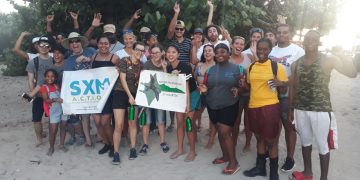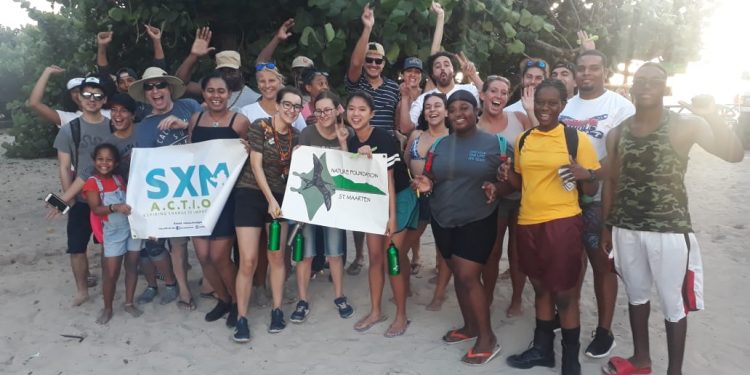PHILIPSBURG, Sint Maarten – The Nature Foundation St Maarten first brand audit cleanup results revealed that the number one of littered items on St Maarten beaches are single-use plastics. Volunteers and members from SXM A.C.T.I.O.N. and the Nature Foundation spent approximately two hours collecting, sorting and recording trash based on brand and type at Mullet Bay Pond on January 11 th , 2020. SXM Beer and Hay! straws sponsored the event and rewarded the volunteers with free snacks and beers. The event was deemed a huge success as it was St. Maarten’s first ever Plastic Brand Audit, and the health of the ecosystem was enhanced by removing a total of 200 pounds of trash.
“With over half of the plastics found being single use items, it strengthens our mission to ban single use plastics on the Dutch side even more. A ban would reduce the pollution on our beaches by over 50% resulting in a healthier, more beautiful and preserved environment for all, attracting tourism in the long term” stated Grace Hansen Reduce and Reuse intern of the Nature Foundation and organizer of the Brand Audit cleanup.
Of the 603 items of trash removed from Mullet Bay Beach and the surrounding area, over half were plastics items (393 items). In total 48.1% of these items were even single-use materials such as cups, bags, plates, straws, cutlery, styrofoam and to go containers, all plastic items which are only used once and then disposed of. The results show that the brand ‘Nestle’ was the number one polluting brand with more than 20 items. Through identifying the most polluting brand, the #BreakFreeFromPlastic movement will be able to compare the data to other nations. This will then be brought to the Nestle corporation to encourage more sustainable packaging.
Almost all of the Nestle products collected were plastic water bottles. These can be exchanged for reusable bottles which have a minimum life of 5 years. One study found that using a reusable water bottle rather than plastic for 5 years can save the average person $6,180. If a family of 4 switches to reusable bottles, they can save around $120,000 in 5 years. Quite some of the single use plastic items found came from a wide variety of brands that were not directly identifiable due to the condition of these items. These plastic pollutants are completely avoidable, green alternatives, reusable materials and proper waste disposal could solve most of St Maarten’s beach pollution.
Proper disposal of our trash is extremely important for the benefit of our environment, health and tourism. The Nature Foundation urges again that individuals make an effort to clean up the area around them after each visit and dispose their trash responsible. Grace Hansen ecplained “people often consider that their individual efforts are not enough to make an impact. If 8 billion people had this mentality, the world would be much more polluted than it already is. It is the individuals that make the conscious effort to reduce their plastic consumption and maintain the health of the areas around them that will save the environment.”
Some alternatives to plastic cutlery include bamboo or travel utensils. Instead of using single use each time takeout food is ordered, bring your own utensils in a travel pack or a ‘spork’ to cut back on your plastic consumption. Reusable metal straws can be used instead of plastic straws as part of a travel kit or when taking out food. Restaurants can switch to eco-friendly alternatives including Hay! Straws, which are biodegradable straws made from wheat and distributed on St Maarten. Another easy alternative is changing protocol by only giving a straw to customers upon request. Bringing your own to go containers to restaurants and your own bags to stores, is another way to cut back on plastics entering the environment.
The Nature Foundation along with the Green Initiatives have been advocating for a single use plastic ban in Sint Maarten. A Call to Action to implement this ban has been shared and signed by thousands. Assist to ban single-use plastic by signing the petition: https://www.change.org/p/less-plastic-more-sxm?fbclid=IwAR3kFW9LLE7KB5Qp1VOYv7vU1wWvtAxvinaf_oqKcj2CprCzp6KEDUJcTxQ


















